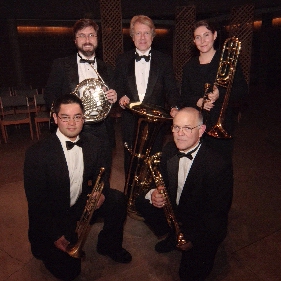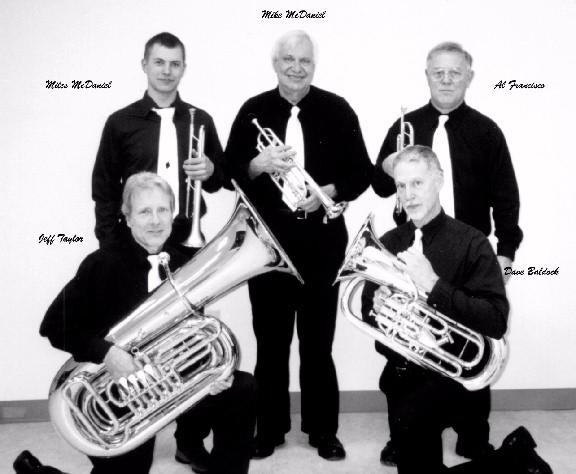|
BRASS QUINTETS
The history of the brass quintet has its origins in the brass ensembles whose popularity peaked during the Renaissance with the antiphonal music of Andrea and Giovanni Gabrieli. Soon, however, their prevalance began to wane, leaving little more than the German tower musicians ("Turmmusiker") whose chorales would drift over the local countryside villages. In the mid-1800s, Hector Berlioz was among the first to revive the brass ensemble, including it in much of his work for the concert hall. Within a few decades the concept of the brass quintet began to bloom, with it's unique and colorful variety of sounds. Chamber music had already embraced the string quartet and woodwind quintet, but now the brass quintet would take its rightful place in expanding the sonic nuance of these smaller groups.
BLACK DIAMOND BRASS WHAT'S IN A NAME? While the Western Washington town of Black Diamond is not directly related to the name of this brass ensemble, the concept very much is. Black Diamond was and continues to be a significant coal-producing community in the Seattle-Puget Sound region, much like those found in the central areas of England. The name for the Black Diamond Brass is a distant reference to those coal mines of Great Britain in the 1800s where brass bands came into being as distractions for the overworked, union-leaning miners of the time. Since then, brass bands have become art forms in their own rights, retaining associations with corporations more for support than distraction, and bringing the level of performance to new heights, including internationally sanctioned competitions. From the brass band and the new orchestral sounds, and aided by newly formed choirs of the Salvation Army, sprang the brass quintet, which has, over the years, established itself as a new standard for brass ensembles. It is the superlative competence and musicianship forged by the glorious brass bands that BDB strives to equal and maintain along with its great enthusiasm for brass. THE ORIGINAL GROUP. The Black Diamond Brass was assembled in September of 2001 by members of the Highline Community Symphonic Band in Burien (Seattle area). All were veteran players, some had played professionally. With a base library of more than 100 pieces leftover from previous quintets, the group quickly established itself in the musical community and have played continuously every since.
A GREAT LOSS. In the late summer of 2004, Mike moved over to second trumpet and our horn player, Todd Frazier, was found (somewhere near the edge of reality), and after auditioning several trombonists later in the fall, Lynne Harris took up the position permanently. Then in April, 2005, a setback occurred in the group when one of the founding members, Mike McDaniel, had a sudden heart attack and died. Even under the gravest of circumstances, once again, the search renewed, this time for another trumpeter. After auditioning several more exceptional players, Toshi Clark was adopted as the newest addition to our musical family. Of course, as Herecleitus put it, "nothing endures but change." And as the spring blossoms burst forth in 2006, so did Toshi's wanderlust... or at least his need for continuing education. As a med student, it was time for him to spread his stethescope and take to the winds of internship. In his place we found the man with the hats, Gary Roberts, who became committed to making the rest of the group wear them. 2007 began a long period of unsettled weather for the Black Diamond Brass. Jeff, pursuing film scoring studies, had rehearsal night conflicts for several months that kept the group from gathering regularly. Gary, after only a year and a half, had found the time and driving requirements overly burdening and decided to leave the group... without a second trumpet again. In 2008, Lynne gave birth to her first child, and while she had played with the group up until most of us had wondered if we shouldn't make sure our midwifing skills were up to date, she ultimately decided to take up motherhood as her second activity to medical studies rather than tromboning with the quintet. 2008 and 2009 contained relatively few rehearsals and even fewer performances, but things changed again in 2010. Efforts were made to revitalize the group. Resusitation followed Heimlich maneuver. Lee Olds was signed on as permanent second trumpet and Mike Lindner was invited to indefinitely bring his trombone around leading back to a period of greater regularity. BDB's MUSIC. The library for The Black Diamond Brass has grown significantly over the years, and though the group plays all the traditional pieces written for the genre, many different types of music are included in BDB's repertoire. Showtunes, Dixieland, rags, and romance are all part of the mix. Black Diamond Brass performs for festivals, weddings, and other events, both public and private, throughout the Puget Sound region. If you are interested in having us perform for you please see our contact page for further information. |

